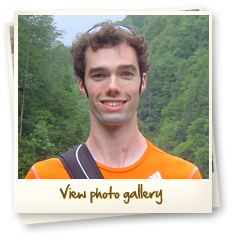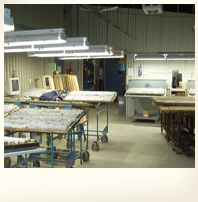

My job in the mining industry provides me with a first hand look at how grass-roots geological work can have an impact on corporate decisions. Not many people realize that one rock sample taken in the field by a geologist can start a chain of events that can help generate or cost a company millions of dollars.
Working as a businessman on Bay St. was always a dream I had as a teenager growing up in the GTA, and throughout my university education I struggled with the idea of being a geologist permanently positioned in the field, so this position as a "Corporate Geologist" allows me effectively use my education while remaining close with family and friends.
So far in my two years of industry experience, I've spent a total of 4 months working in the field at various operations and properties, gaining valuable geological field experience. I spent 3 months working as a geologist at an underground mining operation in northern Quebec and a month in Peru reviewing the geology of a development project. During this time I have also done research and provided technical assistance on several multi-million dollar corporate acquisitions and divestitures.
I really enjoy my work and I am looking forward to more opportunities to travel and develop my technical skills.
A: Associate, Corporate Development
The principal objective of this position is to work closely with the senior vice-president of Corporate Development on any activities related to mergers and acquisitions of new companies or advanced exploration properties. The aforementioned objective can also pertain the valuation of existing IAMGOLD properties and their potential sale (divestiture).
My key responsibilities are:
 Q: Who do you work for, and where are you based?
Q: Who do you work for, and where are you based? A: IAMGOLD Corporation, Head Office Toronto
A: When I'm in the office, I work 9am to 5:15pm. But when I am in the field, hours/shifts vary from the standard 7:30 to 3:30 for a mine site to sun up to sun-down shift in the bush.
A: I spend about 9 months of the year working in the head office in Toronto and the other 3 months working at other IAMGOLD operations or visiting properties for acquisition or divestiture purposes.
A: Computer in the office and rock hammer in the field.

A: Education requirements: BSC in Geology or a degree in Mining Engineering, Knowledge of geological modelling software and financial instruments is an asset (training provided by the company in some cases)
A: Handles pressure and responsibility well, works & learns well independently and in groups, ability to multi-task, and comfortable with international travel to remote locations.
A: $45k to $55k to start, salary increases with experience.
A: I like that my work is always challenging and that I am constantly learning new things.
 Q: What are the advantages?
Q: What are the advantages?A: Working in the mining industry is a very enriching experience. The locations of mine sites can be quite remote at times and accordingly travel to these places provides you with exposure to people and places you would never meet or see as a visitor on vacation.
A: Both practical (geology/mining) and corporate (financial) experience are highly valued commodities in the gold industry and with greater knowledge comes greater responsibility. Ten plus years of corporate & practical experience and an MBA can prepare you for more senior positions from being a regional a VP in Corporate Development to becoming a CEO.

A: Trips to the field or at a mine site can be physically demanding at times but is quite manageable for anyone in good physical condition. Office work is obviously less physically demanding but it is more stressful due to deadlines and the fast-paced nature of the industry.
A: As an undergraduate I had a real passion for the applied aspects of geology as well as finance, so getting involved in the mining industry was the best combination of my interests. Conversely, my only other option would have been to further my education with a masters or college program, but they academic side of things didn't really hold much appeal to me.
 Q: What is your most memorable moment/event/place related to your experience as an Earth scientist?
Q: What is your most memorable moment/event/place related to your experience as an Earth scientist? A: My most memorable moment related to my experience as an earth scientist was my first international trip where I was part of a site visit at the La Arena copper-gold project in the Libertad Province of Peru. The country is beautiful and the people are fantastic-- it was a great experience.
A: My advice to current undergraduates is to be well rounded in their course selections and to not get too focused on one branch of study. In particular I would recommend that geology students take an introductory mining course or two and vice versa for the mining engineers as it is important for people in industry to have a good concept of both geology and mining.
A: I would say that my job is very comparable to that of a junior analyst that works for any major investment bank; the job qualifications would be essentially the same.